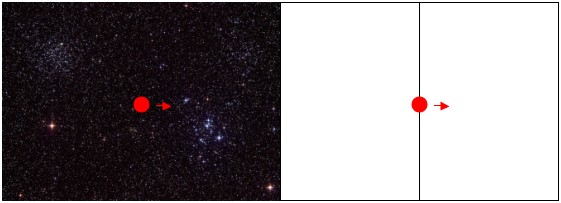Physicist: It’s a little surprising this hasn’t been a post yet.
In order to move from one place to another always takes a little time, no matter how fast you’re traveling. But “time slows down close to the speed of light”, and indeed at the speed of light no time passes at all. So how can light get from one place to another? The short, unenlightening, somewhat irked answer is: look who’s asking.
Time genuinely doesn’t pass from the “perspective” of a photon but, like everything in relativity, the situation isn’t as simple as photons “being in stasis” until they get where they’re going. Whenever there’s a “time effect” there’s a “distance effect” as well, and in this case we find that infinite time dilation (no time for photons) goes hand in hand with infinite length contraction (there’s no distance to the destination).

At the speed of light there’s no time to cover any distance, but there’s also no distance to cover. Left: regular, sub-light-speed movement. Right: “movement” at light speed.
The name “relativity” (as in “theory of…”) comes from the central tenet of relativity, that time, distance, velocity, even the order of events (sometimes) are relative. This takes a few moments of consideration; but when you say that something’s moving, what you really mean is that it’s moving with respect to you.
Everything has its own “coordinate frame”. Your coordinate frame is how you define where things are. If you’re on a train, plane, rickshaw, or whatever, and you have something on the seat next to you, you’d say that (in your coordinate frame) that object is stationary. In your own coordinate frame you’re never moving at all.
How zen is that?

Everything is stationary from its own perspective. Movement is something other things do. When you describe the movement of those other things it’s always in terms of your notion of space and time coordinates.
The last coordinate to consider is time, which is just whatever your clock reads. One of the very big things that came out of Einstein’s original paper on special relativity is that not only will different perspectives disagree on where things are, and how fast they’re moving, different perspectives will also disagree on what time things happen and even how fast time is passing (following some very fixed rules).
When an object moves past you, you define its velocity by looking at how much of your distance it covers, according to your clock, and this (finally) is the answer to the question. The movement of a photon (or anything else) is defined entirely from the point of view of anything other than the photon.
One of the terribly clever things about relativity is that we can not only talk about how fast other things are moving through our notion of space, but also “how fast” they’re moving through our notion of time (how fast is their clock ticking compared to mine).
The meditating monk picture is from here.







Pingback: Angel Xenobiology – Barbourian Meditations